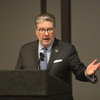District 111: Republican DeLorenzo challenging Democrat Santabarbara for Conservative line
ALBANY COUNTY — Assemblyman Angelo Santabarbara, a Democrat who represents the 111th District in the State Assembly, is being challenged for the Conservative Party nomination by political newcomer and Republican Paul DeLorenzo, an attorney at his family’s law firm in Schenectady.
The June 23 primaries are being held at a reduced number of polling sites as well as by absentee ballot, according to Governor Andrew Cuomo’s executive order, designed to prevent the spread of the coronavirus. Ballots need to be postmarked by June 23 to be valid.
Despite repeated calls and emails over the course of three weeks to his three offices as well as to his spokeswoman, Santabarbara did not respond to requests for an interview.
District 111 was created in 2012, and is comprised of Montgomery County, most of Schenectady County, and the towns of Berne and Knox in Albany County.
Santabarbara first took office in 2013, giving up his full-time job as a civil engineer to do so.
DeLorenzo alone responded to questions on these issues:
— Marijuana: The legalization of recreational marijuana was a big-ticket item expected to be included in this year’s budget before disagreements over whom the marijuana tax revenues would benefit prompted Cuomo to pull back from the issue temporarily. Assuming that the push resumes, where do you stand on the allocation of marijuana tax revenues? Do you believe that the new revenues should go to minority communities, or are you in line with the governor’s view that the money should be disbursed more widely?
— Rural broadband: Remote working and learning related to the coronavirus has highlighted the difficulty rural areas have accessing high-speed broadband connections. Berne-Knox-Westerlo Superintendent Timothy Mundell said in an April press conference that 30 percent of that BKW’s students don’t have internet access. Hudson Valley Wireless General Manager Jason Guzzo indicated to The Enterprise that one of the difficulties in serving rural areas is the low return on investment, with the last 2-percent of a coverage area’s unserved population being the most expensive by far, and that subsidies would be critical to total coverage. In what way can you help rural areas achieve the coverage they need?
— Health care: Called one of the most ambitious pieces of legislation the state has seen in decades, single-payer health care remains contentious in lawmakers’ chambers. Health care has been a significant conversation in national politics, and although Cuomo said he’d prefer to see a single-payer system implemented at the federal level, he said he would sign a bill if given the chance. Do you think that single-payer health care is a system that should continue to be pursued and debated in New York, or are you against the idea entirely?
—Reform: In the midst of ongoing protests over police brutality, Cuomo has proposed his “Say their Name” reform agenda, allowing for transparency of prior disciplinary records of police by reforming 50-a of the civil rights law; banning chokeholds by police; prohibiting false race-based 9-1-1 reports and make them a crime; and designating the attorney general as an independent prosecutor for matters relating to the deaths of unarmed civilians caused by law enforcement. Would you support these initiatives and why or why not?
The “Say Their Name” reform package was signed by Cuomo on June 12, the day of The Enterprise’s interview with DeLorenzo; and
— Recovery: Towns in our coverage area, like those across the state, have been hit hard by the coronavirus and are worried about financing basic government services with loss in sales-tax revenues from Albany County while not wanting to overburden property owners, who are already suffering, with higher taxes. If money is not forthcoming from the federal government, what role should the state play?
Paul DeLorenzo
ALBANY COUNTY — Paul DeLorenzo is an attorney with his family’s law firm — DeLorenzo, Grasso & Dalmata, in Schenectady — who decided to run shortly after his father died two years ago.
“I’m trying to honor my father’s legacy,” DeLorenzo said. “I know he would be proud of me if I went forward with this, and I am going forward with this.”
DeLorenzo is seeking the Conservative Party line because, as a Republican, he says many of the issues and values backed by the two parties go “hand-in-hand.”
“I’m anti-bail-reform completely,” DeLorenzo said, by way of example. “I’d rather the local courts take care of it — let me put it that way. They know the players better, the local feel for everything; they may even know the family members better. The judge, locally, will know just how to handle the situation. You can’t just dole it out by statute. Each case has got to be different. Case by case, everybody’s different … Let the local judge take care of it.”
However, he agrees with Governor Andrew Cuomo, a Democrat, on the disbursement of marijuana tax revenues.
“I’m more in line with the funds being disbursed throughout the state,” DeLorenzo said, “like other funds are disbursed. Or should be disbursed.”
He added, though, that he thinks taxes in New York are too high overall.
“One of the reasons I’m running, too,” DeLorenzo said, “is because taxes in New York State are incredibly high. We’ve talked about this many times sitting around a campfire that they’re chasing businesses out, chasing people out with these high taxes … My goal is to stop some of that.”
When asked about rural broadband, DeLorenzo said that the issue reflects his belief that tax revenues should be applied to areas in need, regardless of where the taxes come from.
“That’s a good example of why we should be able to [move] tax resources from one area to an area that truly needs it,” DeLorenzo said. “Students need to have that access, and I’m all for pulling money from another revenue source and bringing it in so that everybody in the Hilltowns can have the same thing that they do in Schenectady, Albany, Saratoga. The tax money is coming in anyway, so let’s put it to good use there.”
DeLorenzo said he needed to do more research before he could answer questions about single-payer healthcare with any depth, but highlighted what would be his strategy for dealing with difficult issues as a politician.
“One side would like to see it paid for a hundred percent; the other side does not,” he said. “And nothing’s getting done. I think it’s got to be really looked at. We have to discuss it, Democrats and Republicans alike, and find out the best way to handle [it].”
DeLorenzo was most vocal on the repeal of section 50-a of New York State’s civil rights law, which had prevented citizens from accessing “[law enforcement] personnel records used to evaluate performance toward continued employment or promotion.” Governor Andrew Cuomo signed the reform package that amended that law the day The Enterprise spoke with DeLorenzo.
“I don’t support allowing the public to see prior issues with any law-enforcement officer,” DeLorenzo said. “Not entirely. Not with such easy access.”
He explained that, without a fair trial, “good police officers” would be subject to the court of public opinion, regardless of whether a filed complaint is true or not.
“And now you’ve hurt a good man,” DeLorenzo said, “a good police officer, which we have plenty of those here. The minority of the police officers that are bad — I mean, that’s a minority. There are a lot of good police officers in this area. And I think they should be protected. They should not be hurt by allowing every little thing to come out to the public.”
As for coronavirus recovery, DeLorenzo asserts that it’s the state’s responsibility to “step up to the plate” if the federal government fails to provide funding that helps municipalities wade out from the difficulties of economic torpor.
“If the federal government doesn’t provide what’s needed to the state or the locality, the state needs to step up to take care of what needs to be taken care of for the welfare of its citizens,” DeLorenzo said. “It can’t just let it stay dormant. The state would have to step up to the plate and find the way to get the funds that are necessary and help these people out, help your neighbors out.”
Related to the coronavirus, DeLorenzo chastised incumbent Assemblyman Angelo Santabarbara for “basically stay[ing] out of” the way as Governor Cuomo issued executive orders, one of which required nursing homes to accept patients who tested positive for the coronavirus, which has proved controversial.
“I’ve got a heart for our elderly,” DeLorenzo said. “I want to make sure they’re taken care of ... I just don’t like the way they were treated this time. I think my adversary fell short and didn’t protect them one bit, and that’s where I would come into play.”



